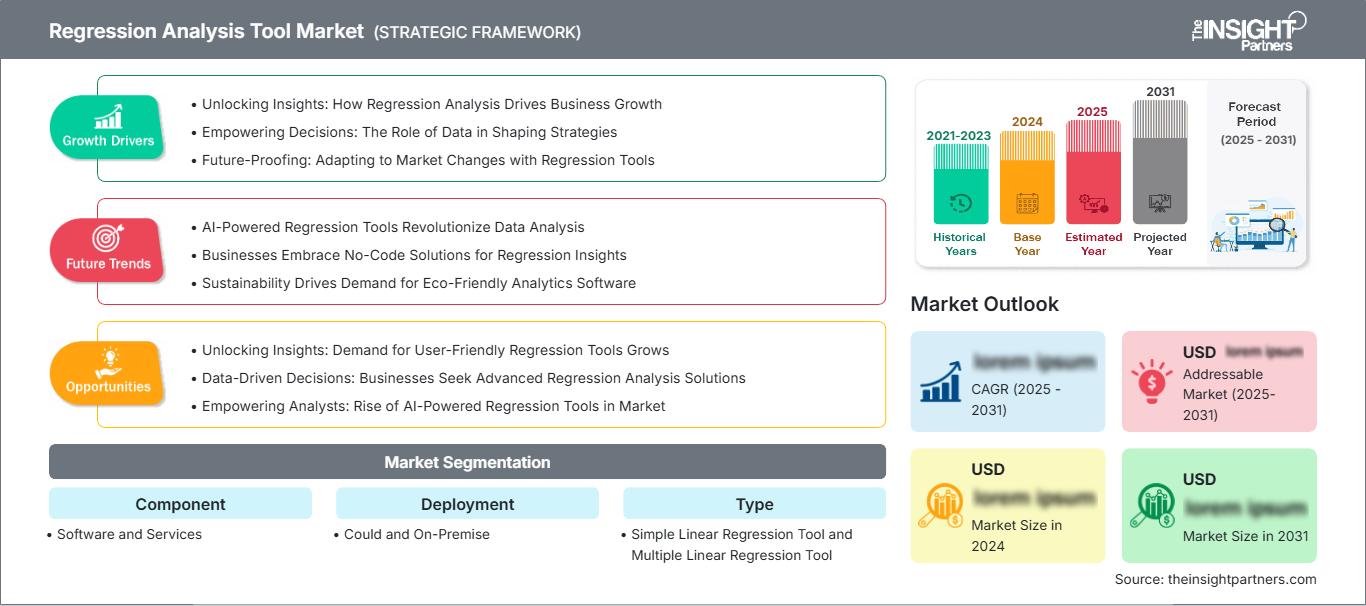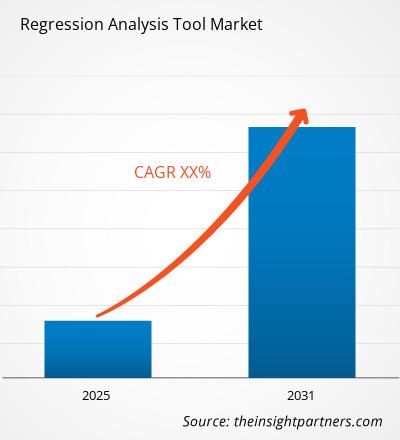Regression Analysis Tool Market Overview, Growth, Trends, Analysis, Research Report (2025-2031)
Regression Analysis Tool Market Size and Forecasts (2021-2031), Global and Regional Share, Trends, and Growth Opportunity Analysis by Component (Software and Services); Deployment (Could and On-Premise); Type (Simple Linear Regression Tool and Multiple Linear Regression Tool); Application (BFSI, IT and Telecommunication, Healthcare, Media and Entertainment, Transportation and Logistics, Education, Retail, and Others); Organization Size (SMEs and Large Enterprise); and Geography
Historic Data: 2021-2023 | Base Year: 2024 | Forecast Period: 2025-2031- Report Date : Mar 2026
- Report Code : TIPRE00026882
- Category : Technology, Media and Telecommunications
- Status : Upcoming
- Available Report Formats :


- No. of Pages : 150
The Regression Analysis Tool Market is expected to register a CAGR of XX% from 2025 to 2031, with a market size expanding from US$ XX Million in 2024 to US$ XX Million by 2031.
The report is categorized by Component (Software and Services) and further analyzes the market based on Deployment (Could and On-Premise). It also examines the market by Type (Simple Linear Regression Tool and Multiple Linear Regression Tool) and Industry Application (BFSI, IT and Telecommunication, Healthcare, Media and Entertainment, Transportation and Logistics, Education, Retail).A comprehensive breakdown is provided at global, regional, and country levels for each of these key segments.
The report includes market size and forecasts across all segments, presenting values in USD. It also delivers key statistics on the current market status of leading players, along with insights into prevailing market trends and emerging opportunities.
Purpose of the Report
The report Regression Analysis Tool Market by The Insight Partners aims to describe the present landscape and future growth, top driving factors, challenges, and opportunities. This will provide insights to various business stakeholders, such as:
- Technology Providers/Manufacturers: To understand the evolving market dynamics and know the potential growth opportunities, enabling them to make informed strategic decisions.
- Investors: To conduct a comprehensive trend analysis regarding the market growth rate, market financial projections, and opportunities that exist across the value chain.
- Regulatory bodies: To regulate policies and police activities in the market with the aim of minimizing abuse, preserving investor trust and confidence, and upholding the integrity and stability of the market.
Regression Analysis Tool Market Segmentation
Component
- Software and Services
Deployment
- Could and On-Premise
Type
- Simple Linear Regression Tool and Multiple Linear Regression Tool
Application
- BFSI
- IT and Telecommunication
- Healthcare
- Media and Entertainment
- Transportation and Logistics
- Education
- Retail
Customize This Report To Suit Your Requirement
Get FREE CUSTOMIZATIONRegression Analysis Tool Market: Strategic Insights

-
Get Top Key Market Trends of this report.This FREE sample will include data analysis, ranging from market trends to estimates and forecasts.
Regression Analysis Tool Market Growth Drivers
- Unlocking Insights: How Regression Analysis Drives Business Growth
- Empowering Decisions: The Role of Data in Shaping Strategies
- Future-Proofing: Adapting to Market Changes with Regression Tools
Regression Analysis Tool Market Future Trends
- AI-Powered Regression Tools Revolutionize Data Analysis
- Businesses Embrace No-Code Solutions for Regression Insights
- Sustainability Drives Demand for Eco-Friendly Analytics Software
Regression Analysis Tool Market Opportunities
- Unlocking Insights: Demand for User-Friendly Regression Tools Grows
- Data-Driven Decisions: Businesses Seek Advanced Regression Analysis Solutions
- Empowering Analysts: Rise of AI-Powered Regression Tools in Market
Regression Analysis Tool Market Regional Insights
The regional trends and factors influencing the Regression Analysis Tool Market throughout the forecast period have been thoroughly explained by the analysts at The Insight Partners. This section also discusses Regression Analysis Tool Market segments and geography across North America, Europe, Asia Pacific, Middle East and Africa, and South and Central America.
Regression Analysis Tool Market Report Scope
| Report Attribute | Details |
|---|---|
| Market size in 2024 | US$ XX Million |
| Market Size by 2031 | US$ XX Million |
| Global CAGR (2025 - 2031) | XX% |
| Historical Data | 2021-2023 |
| Forecast period | 2025-2031 |
| Segments Covered |
By Component
|
| Regions and Countries Covered |
North America
|
| Market leaders and key company profiles |
|
Regression Analysis Tool Market Players Density: Understanding Its Impact on Business Dynamics
The Regression Analysis Tool Market is growing rapidly, driven by increasing end-user demand due to factors such as evolving consumer preferences, technological advancements, and greater awareness of the product's benefits. As demand rises, businesses are expanding their offerings, innovating to meet consumer needs, and capitalizing on emerging trends, which further fuels market growth.

- Get the Regression Analysis Tool Market top key players overview
Key Selling Points
- Comprehensive Coverage: The report comprehensively covers the analysis of products, services, types, and end users of the Regression Analysis Tool Market, providing a holistic landscape.
- Expert Analysis: The report is compiled based on the in-depth understanding of industry experts and analysts.
- Up-to-date Information: The report assures business relevance due to its coverage of recent information and data trends.
- Customization Options: This report can be customized to cater to specific client requirements and suit the business strategies aptly.
The research report on the Regression Analysis Tool Market can, therefore, help spearhead the trail of decoding and understanding the industry scenario and growth prospects. Although there can be a few valid concerns, the overall benefits of this report tend to outweigh the disadvantages.
Ankita is a dynamic market research and consulting professional with over 8 years of experience across the technology, media, ICT, and electronics & semiconductor sectors. She has successfully led and delivered 100+ consulting and research assignments for global clients such as Microsoft, Oracle, NEC Corporation, SAP, KPMG, and Expeditors International. Her core competencies include market assessment, data analysis, forecasting, strategy formulation, competitive intelligence, and report writing.
Ankita is adept at handling complete project cycles—from pre-sales proposal design and client discussions to post-sales delivery of actionable insights. She is skilled in managing cross-functional teams, structuring complex research modules, and aligning solutions with client-specific business goals. Her excellent communication, leadership, and presentation abilities have enabled her to consistently deliver value-driven outcomes in fast-paced and evolving market environments.
- Historical Analysis (2 Years), Base Year, Forecast (7 Years) with CAGR
- PEST and SWOT Analysis
- Market Size Value / Volume - Global, Regional, Country
- Industry and Competitive Landscape
- Excel Dataset
Recent Reports
Testimonials
The Insight Partners' SCADA System Market report is comprehensive, with valuable insights on current trends and future forecasts. The team was highly professional, responsive, and supportive throughout. We are very satisfied and highly recommend their services.
RAN KEDEM Partner, Reali Technologies LTDsI requested a report on a very specific software market and the team produced the report in a few days. The information was very relevant and well presented. I then requested some changes and additions to the report. The team was again very responsive and I got the final report in less than a week.
JEAN-HERVE JENN Chairman, Future AnalyticaWe worked with The Insight Partners for an important market study and forecast. They gave us clear insights into opportunities and risks, which helped shape our plans. Their research was easy to use and based on solid data. It helped us make smart, confident decisions. We highly recommend them.
PIYUSH NAGPAL Sr. Vice President, High Beam GlobalThe Insight Partners delivered insightful, well-structured market research with strong domain expertise. Their team was professional and responsive throughout. The user-friendly website made accessing industry reports seamless. We highly recommend them for reliable, high-quality research services
YUKIHIKO ADACHI CEO, Deep Blue, LLC.This is the first time I have purchased a market report from The Insight Partners.While I was unsure at first, I visited their web site and felt more comfortable to take the risk and purchase a market report.I am completely satisfied with the quality of the report and customer service. I had several questions and comments with the initial report, but after a couple of dialogs over email with their analyst I believe I have a report that I can use as input to our strategic planning process.Thank you so much for taking the extra time and making this a positive experience.I will definitely recommend your service to others and you will be my first call when we need further market data.
JOHN SUZUKI President and Chief Executive Officer, Board Director, BK TechnologiesI wish to appreciate your support and the professionalism you displayed in the course of attending to my request for information regarding to infectious disease IVD market in Nigeria. I appreciate your patience, your guidance, and the fact that you were willing to offer a discount, which eventually made it possible for us to close a deal. I look forward to engaging The Insight Partners in the future, all thanks to the impression you have created in me as a result of this first encounter.
DR CHIJIOKE ONYIA MANAGING DIRECTOR, PineCrest Healthcare Ltd.Reason to Buy
- Informed Decision-Making
- Understanding Market Dynamics
- Competitive Analysis
- Identifying Emerging Markets
- Customer Insights
- Market Forecasts
- Risk Mitigation
- Boosting Operational Efficiency
- Strategic Planning
- Investment Justification
- Tracking Industry Innovations
- Aligning with Regulatory Trends




















 Get Free Sample For
Get Free Sample For